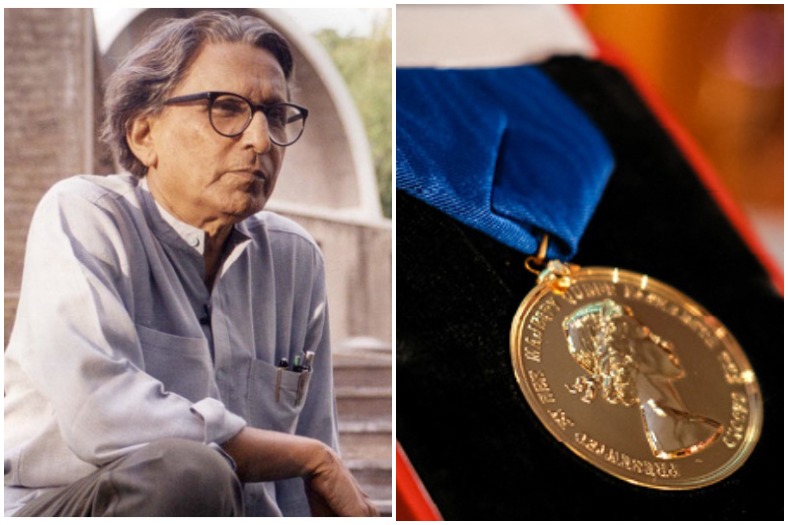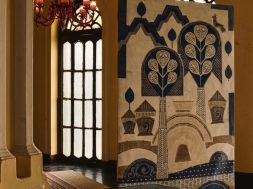
Balakrishna Doshi from India won the Royal Gold Medal, the world’s highest award in architecture in 2022.
In recognition of lifetime work, the Royal Gold Medal is personally recognized by Queen Elizabeth II and awarded to a person or group of individuals who have had a significant impact on the progress of architecture.
The Royal Institute of British Architects (RIBA) has announced that it will receive the Royal Gold Medal 2022, one of the world’s highest honors for renowned Indian architect Balakrishna Doshi Architecture. The RIBA said on Thursday that the 94-year-old convict, with a career of 70 years and over 100 built projects, has influenced the direction of construction in India and its environs through both his practice and his teaching.
In recognition of lifetime work, the Royal Gold Medal is personally recognized by Queen Elizabeth II and awarded to a person or group of individuals who have had a significant impact on the progress of architecture. Upon hearing of the big victory, the convict said, “I am very surprised and very humbled to receive the Royal Gold Medal from the Queen of England. What an honor it is.”The news of this award brings back memories of my work with Le Corbusier when I received the news of the Royal Gold Medal in 1953. I thank His Excellency for his enthusiasm for receiving this honor. I remember clearly. He told me figuratively, ‘I am amazed at how big and huge this medal is, “he shared.
“Today, six decades later, in honor of my six decades of practice – I am truly proud to be honored with the same award as my mentor, Le Corbusier. My wife, my daughters in particular, and my heartfelt thanks to my team and associates at Sangat My Studio.” He said. The RIBA claims that their buildings combine pioneering sophistication with the local language, conveyed through a deep appreciation of Indian architecture, climate, local culture, and handicraft traditions. His projects include administrative and cultural facilities, housing development, and residential buildings. He is internationally known for his visionary urban planning and social housing projects, as well as his work in education as a Visiting Professor at Universities in India and around the world.
RIBA President Simon Allford said: “It is an honor and a pleasure to chair the committee in selecting Balakrishna Dosi as the 2022 Royal Gold Medalist. An independent thinker – one who can undo, repeat and develop an action. ” “In the twentieth century, when technology helped many architects to build independently of the local environment and tradition, Balakrishna became closely associated with his interior: the atmosphere, new and old, technologies and crafts.” “Balakrishna Doshi’s outstanding contribution to architecture, architecture, craft, and urban design practice has made him the most deserving recipient of this award and I look forward to presenting him with a medal next year.” Born into a family of furniture makers in Pune in 1927, Balakrishna Doshi worked as a senior designer (1951–54) with Le Corbusier four years ago at the JJ School of Architecture in Bombay for four years in Paris and India. . To oversee projects in Ahmedabad. He collaborated with Louis Khan to build the Indian Institute of Management in Ahmedabad and they continued to collaborate for over a decade.
He founded his own architecture practice in 1956 with two architects. Today architecture is a multi-disciplinary practice with three generations of partners and sixty employees. The practice invites conversation and its philosophy of active participation is also applied to their office space – it has an open door that invites passers-by to come inside. Shreyas Comprehensive School Campus (1958-63) was one of Doshi’s major projects in Ahmedabad; Atira Guest House Low-Accommodation (1958); Indology Institute for the Preservation of Rare Documents (1962); Ahmedabad School of Architecture – renamed CEPT University in 2002 – focuses on creating spaces that promote collaborative learning; Tagore Hall and the Memorial Theater (1967); Brutalist Auditorium with 700 seats. Premabhai Hall (1976) Theater and Auditorium. In addition, he also founded the Indian Institute of Management (1977–1992) in Bangalore; Sangat (1981), studio for his architectural practice, architecture; Canoria Center for the Arts (1984), an arts and creative center; And Cast Housing in the Forest (1989), Indore.












